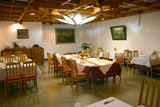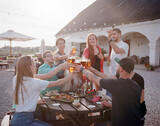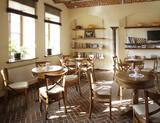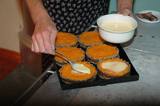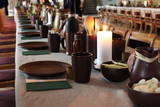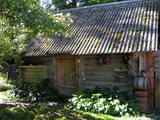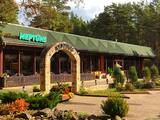| No | Name | Description |
|---|---|---|
|
The farm features twelve friendly horses from Latvia, Lithuania and Belarus, as well as three eager dogs of various species, along with rabbits, chickens, cows and cats. Here you will feel the true country spirit in four adjoining farms – Klajumi, Ganiņi, Ķemeri and Krasti. The location is near the “Rings of the Daugava” Nature Park, and you can go horseback riding along the border between Latvia and Belarus. Latvian cuisine: Schnitzel of mushrooms, potato dumplings with dried mushrooms or meat, cream sauce and onions, baked chanterelles with new potatoes, sautéed vegetables and mushrooms, strawberries with ice cream, moonshine liquor. Special foods: Cranberry fool a la Klajumi |
||
|
The restaurant is situated in the motel Brencis on the 38th km of Riga-Bauska highway. |
||
|
Tourists can learn about the history of the estate and the brewing of beer, beginning with raw materials and ending with finished products. The visit is enriched by tastings of live beer and stories about Latvia’s traditional holiday beverage. Alongside the brewery is a store which sells live beer, homemade goodies and selected souvenirs. The “Valmiermuižas alus virtuve” saloon popularises Latvian beers and uses beer in various dishes. A modern approach to homemade products is used to prepare foods and beer-based snacks. There is a beer garden during the summer, and the saloon merges traditional things with modern ones. Latvian cuisine: Smoked pork, filet of pike from Lake Burtnieks, green pea mash, with loganberries, quince, pumpkin birch juice and mushroom sauce as accompaniments. Special foods: Slice of pork marinated in unfiltered winter beer. |
||
|
The “Upenite” country house is located on the southern shore of Lake Ciritis. This farm nurtures Lettigalian traditions, serves Lettigalian foods, produces dairy products (including cheeses), grows local plants (which you can purchase), and offers a chance to visit a proper Lettigalian black sauna. The owners themselves will serve as the sauna masters. Master’s classes in the baking of tortes are offered. |
||
|
The café is in the Information Centre of the Tērvete Nature Park. It offers appetizers and complex luncheons, as well as baked goods and tortes. Group visits must be booked in advance. The café can serve groups of 10-50 people indoors and 100-200 people outdoors. Latvian cuisine: Sautéed turnips with grits, roast pork with onions, “Forester’s porridge”. Special foods: “Elf’s pocket with wild mushrooms”. |
||
|
Located in Kārļi, the guesthouse is in a building that used to serve as the servant’s home for the former noble estate. It mostly uses local ingredients and only prepares meals on the basis of individual orders that are filed in advance. Latvian cuisine: Roast meats, apple bread, homemade ice cream, bread soup, cranberry fool, wild mushroom sauce, homemade wine. Special foods: Trout from the Kārļi stream. |
||
|
The restaurant offers local cuisine from fresh and seasonal ingredients. Dishes are prepared on order and individually or to guests at the local estate. A global approach to cuisine. |
||
|
The saloon is in the restored mansion of the Sieksāte (Berghof) Estate, and there is a milk museum in the granary and the cheese-making building. Guests can try their hand at milking cows and at churning and tasting fresh butter. Latvian cuisine: Rye bread, herring with cottage cheese, milk soup, boiled potatoes a la countryside with chives, sliced venison, pike-perch in cream, plaice with peas, potato pancakes with lingonberry jam. Special foods: Piena Estate cheesecake, homemade egg liqueur. |
||
|
A Latvian farm merging the historical and the modern. Local dishes are prepared, and weddings in the spirit of old traditions are organised. The farm works with local farmers and manufacturers. Latvian cuisine: Cream of vegetable soup with greens and croutons, oven-roasted pike with cheese and seasonal vegetables, cottage cheese crème with berry sauce. |
||
|
The farm is located in the north-west of Latvia, which was historically inhabited by Livonians and, nowadays, is often called the Livonian coast. Farm is one of the first homes in Kolka, 1.2 km from Kolkasrags, the furthest northern point of Courland separating the Baltic Sea from the Gulf of Riga. The owner of the farm demonstrates the way in which the traditional Northern Kurzeme dessert that is a carrot bun and is known as a "sklandrausis" is prepared. Sklandrausis is registered in the EU food quality scheme as a product with traditional speciality guaranteed. Hikers can take a tour to see the industrial history of Kolka, complete with theatrical elements and tasting of Latvia’s best sprats. Latvian cuisine: Porridge with fried onions and meat, kefir, herbal teas. Special foods: Carrot buns. |
||
|
1.5 km from the centre of Mārciena, the restaurant offers “old world,” Latvian and Baltic German dishes in a modern way. Fruit, vegetables, meat and fish come from the estate’s gardens and fro local farmers. |
||
|
The windmill building (1875) is now a museum and offers well known wedding traditions. Guests can catch fish in the local pond and then cook them. |
||
|
Meals are served in the ancient dining room of the knights under the vaulted ceiling, with candlelight and medieval music. Use wooden spoons or your hands to enjoy the same kind of feast that was enjoyed in the past by barons, monks and servants. Latvian cuisine: Lentil soup with meatballs, beer soup, apple soup with raisins, peas with hemp, potted sautéed meat with caraway seeds, chanterelles in cream sauce, hunter’s sausage with cabbage, roast loin of pork, blood sausage, roast leg of duck with lingonberry sauce, stream trout, homemade cottage cheese with strawberries, plum dessert with whipped cream. Special foods: “Castle Walls with Guards”: Beer-roasted pork ribs with sauerkraut. |
||
|
The restaurant is situated in Skulte district – 8 km away from Saulkrasti, in the direction of Minhauzen Museum. It is on a steep cliff alongside the sea, with a lovely view of the sea from the summer terrace during sunsets. The restaurant works with local fishermen, and the restaurant’s menu consists mostly of high quality local Baltic sea fish. Latvian cuisine: Cold soup, fish soup, porridge, grey peas with bacon and onions, herring with potatoes and cottage cheese, stacked rye bread, crepes with jam, rhubarb or sea buckthorn sorbet. Special foods: Various fish dishes – bream, pike-perch, perch, plaice, salmon and herring. |
||
|
The house is on the banks of the Pilda River. It is a biological farm with fruits, berries, vegetables and honey prepared and served in honour of Lettigalian traditions. "Aizupmajas" offers a traditional Lettigalian black sauna with linden or oak branch switches and herbal teas. You can also take part in farm work or spend the night in the restored granary. Latvian cuisine: Cold soup, Lettigalian sauerkraut soup, crepes, oven-baked potatoes, sautéed pike, homemade steak haché, whipped rhubarb dessert, birch juice, herbal teas. Special foods: Roughly grated potato pancakes with cream and lingonberry jam. |
||
|
The owners are third-generation fishers, and they will be happy to sell you some smoked local fish. Tour groups can take part in active leisure related to cultural aspects of smoking tasty fish (tossing a boot into the sea, stories from fishermen’s wives, a theatrical performance, and the smoking and tasting of fish). Latvian cuisine: Smoked and dried plaice, hot-smoked eelpout and other fish prepared on the basis of ancient local recipes. |
||
|
Līgatne wines and ciders are made from fruits, berries, plants and flowers grown in the territory of Gauja National Park. The hosts offer a romantic candlelit tasting of cider and other drinks in the sandstone caves of Līgatne (approx. 30 minutes). You can also snack on cheese made of cow milk and purchase homemade wine and other beverages. |
||
|
Here you can examine and purchase crafts by more than 40 Lettigalian craftspeople. A guide dressed in an Ancient Lettigalian folk costume will tell you about the lives of ancient Baltic tribes, the emergence of craftsmanship in the region, ancient laws related to ethics and work, and traditions. There are demonstrations of the crafts and lessons about the ancient skills. Groups can enjoy a luncheon of Lettigalian dishes, and learn how to bake bread and prepare beverages in an old-fashioned Lettigalian kitchen. The local craftsmen's salon and home producer's store Cymuss and Latgaļu kukņa, a member of the Latgale culinary heritage network. For groups, Latgaļu kukņa offers lunches and a special skills school for learning to prepare Latgalian food, bread and drinks. Latvian cuisine: Grey peas, dumplings in cream sauce, Lettigalian pastries and moonshine alcohol. |
||
|
The restaurant is on the seaside and in the Ķemeri National Park. It is one of the oldest restaurants in Jūrmala and features a teahouse and outdoor terrace during the summer. In only 44 km distance from Riga you can enjoy sea air, pine soughing and great meal. In the restaurent chefs use quality local products. The menu changes every season. |
||
|
The venue is located in the forest, with a set of ponds that very much bring the landscape back to life. It offers Latvian dishes and culinary seminars for those who are interested. Some dishes are cooked on large pans on a campfire or smoked or grilled. Latvian cuisine: Hot or cold tomato soup, salmon in a honey marinade, honey buns (baked on a campfire), various pancakes, country torte from biological and local ingredients. Special foods: Whipped rye flour dessert. |
||

